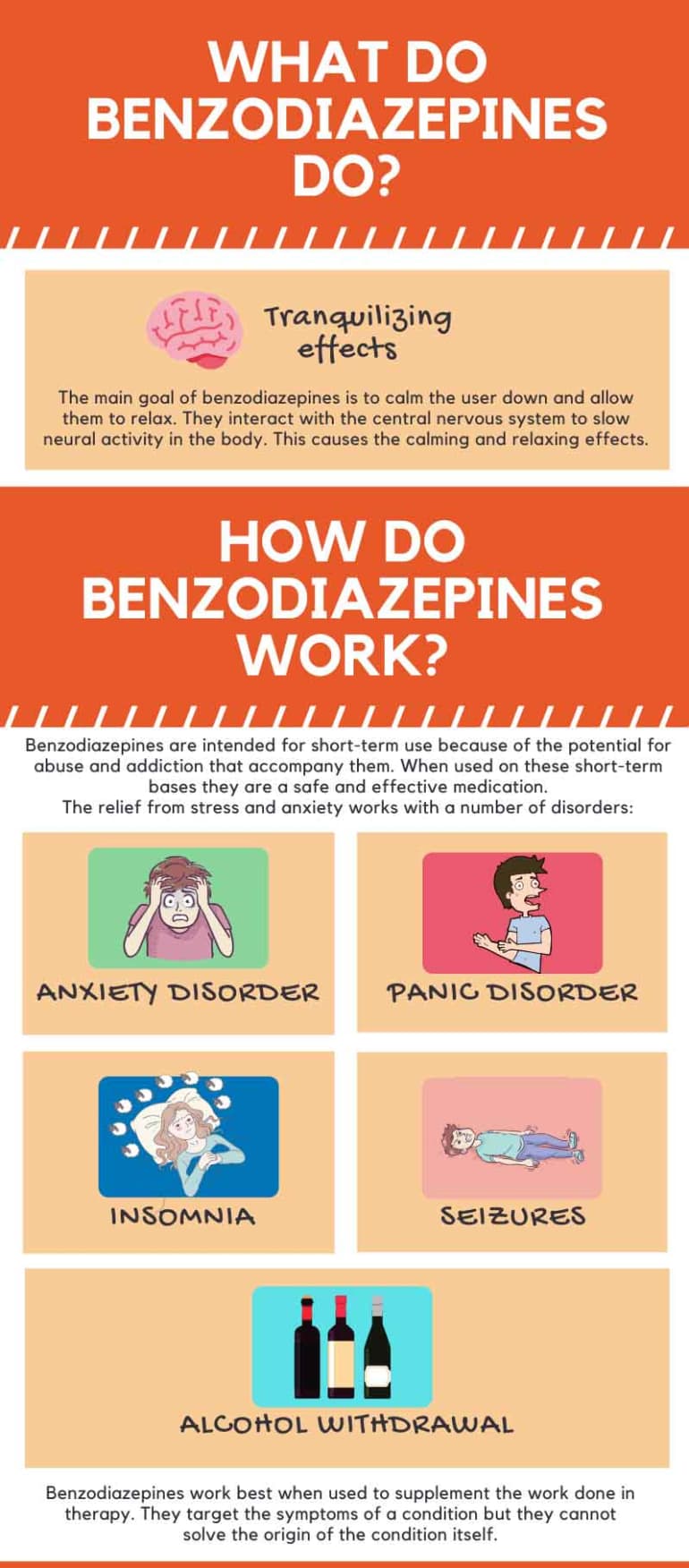With the attention focused on the opioid epidemic, you may ask, “Is Xanax an opioid?” Simply put, Xanax is not an opioid. Opioids include prescription medications like methadone, oxycodone, or hydrocodone, as well as semi-synthetic opioids like heroin and synthetic opioids like fentanyl. Prescription and synthetic opioids are often prescribed to treat severe pain. These medications decrease pain intensity in the nervous system or specific brain receptors. Xanax is a benzodiazepine (BZD).
What Is a Benzodiazepine?
Xanax and other BZDs are among the majority of prescribed psychiatric medications. Medical professionals prescribe these sedatives – Valium, Xanax, and Klonopin – to alleviate the symptoms of generalized anxiety disorder (GAD), insomnia, or other mental health disorders. They achieve their effect on the brain by increasing the level of the inhibitory neurotransmitter GABA. The impact of BZDs on your brain leads to feelings of calmness or feeling sedated.
Before your doctor prescribes Xanax, your risk of developing tolerance, abuse, or addiction will be considered. Your doctor can also give an in-depth answer to “Is Xanax an Opioid?” With your input, your healthcare provider will determine the length of time you will take Xanax.
What Are the Hazards of Xanax?
Benzodiazepines are prescribed for short-term help. However, when used on a long-term basis, BZDs pose risks to your well-being. Because BZDs, like Xanax, bind to your brain’s neurotransmitters after about four weeks of use, you may need a higher dose to feel relief. Further, another hazard of BZDs is the potential to produce physical and/or emotional addiction, even when used as prescribed.

In 1955, the first benzodiazepine was developed. Gradually, the use of BZDs replaced opiate derivatives because of their potential benefits. By the 1970s, however, BZDs became the most abused drugs. Thus, the Food and Drug Administration (FDA) placed BZDs on its drug list in the late 1970s. Later, the American Psychiatric Association (APA) recognized the risk of BZD dependence in 1990.
Xanax and other BZD misuse are increasing. An article by Drug and Alcohol Dependence states, “Benzodiazepine misuse is a growing public health problem, with increases in benzodiazepine-related overdose deaths and emergency room visits in recent years.” Xanax (BZDs) and opioids are highly addictive and considered a public health issue. The question, “Is Xanax an opioid?” spotlights the confusion between opioids and benzodiazepines. While Xanax isn’t an opioid, its increased use makes it dangerous.

Benzodiazepines are a helpful medication for those who struggle with anxiety and sleep disorders. But they’re dangerous in the hands of recreational users.
More infoAre There Benefits of Benzodiazepines?
Physician-prescribed benzodiazepines can regulate the symptoms of GAD or provide short-term relief for anxiety. Xanax can aid with the symptoms of anxiety linked to depression and panic disorder with or without agoraphobia – the fear of situations or places that can cause feelings of helplessness, panic, or embarrassment. Medical professionals will also prescribe Xanax to aid with alcohol withdrawal or chronic pain. Moreover, Xanax is a potentially viable alternative to opioids because it has antispasmodic ingredients.

How Can I Safely Treat Xanax Addiction?
Regular use of benzodiazepines BZDs can cause severe, dangerous psychological and physical dependence. Withdrawal symptoms from BZDs are similar to those of alcohol withdrawal. Some of the symptoms associated with BZD withdrawal are life-threatening. They can include:
- Sleep disturbances
- Increased anxiety and tension
- Irritability
- Panic attacks
- Sweating
- Hand tremor
- Nausea and dry vomiting
- Heart palpitations
- Seizures
- Psychotic reactions
There are also symptomatic patterns. You may experience a rebound of anxiety and insomnia 1 to 4 days after you stop taking BZDs. The rebound won’t last long. However, being under the care of a licensed addiction specialist can ease these symptoms. Because of the withdrawal symptoms, you shouldn’t try detoxing alone. Instead, seek help from substance and mental health treatment professionals.
A comprehensive treatment program doesn’t mean your chronic pain will go untreated. You may ask, “Is Xanax an Opioid?” because it’s also used as a painkiller. Xanax can be prescribed for pain but remains a BZD.
Licensed medical professionals will work with you to address your chronic pain safely. Talk with your doctor about your concerns, and together you can build a treatment plan that meets your needs. At Hawaii Island Recovery, our mental health and addiction specialists are licensed professionals. They engage you in evidence-based therapies proven to help treat addiction, chronic pain, and co-occurring disorders.

Hawaii Island Recovery offers 3 powerful evidence-based treatment therapies as part of the well-rounded approach to your treatment.
More infoCan I Find Purpose in Treatment?
Is Xanax an opioid? No. However, it is an addictive medication. Substance and mental health treatment, as is acknowledging the mind-body connection, is vital. Engaging in comprehensive care guides you in treatment and recovery. While you are in treatment, take the opportunity to engage in experiences. Xanax addiction can estrange you from your friends, loved ones, and yourself. You may not know how to engage with others when you enter treatment or struggle to find a connection to yourself. Hawaii Island Recovery knows experiences are essential because they help you re-engage in life.

A connection is formed when you engage in group activities like nature-based, ocean-based, or educational experiences. Being outside, learning about others and yourself allows you to free your mind. Inspiration, curiosity, purpose, and a connection can lead you to a healthy recovery. The lessons learned, and insights into yourself are the foundations for growth. You can find a purpose in treatment by allowing yourself to experience it. Breaking out of your comfort zone means leaving the confines of unhealthy habits and adverse situations.
Xanax addiction doesn’t determine who you are. Enjoying the moment gives you the space to let in healthy thoughts and practice healthy habits.
Is Xanax an opioid? Xanax is not an opioid. But, it has the potential for you to become physically and psychologically addicted. Xanax, a benzodiazepine, is prescribed to treat mental health disorders like anxiety and/or insomnia. Xanax informs calmness and sedation. Over time your doctor may need to increase your dosage. Because of its high risk of addiction, Hawaii Island Recovery created a comprehensive treatment program. Licensed professionals will guide you through detox and treatment. We encourage you to stay connected by engaging with our alumni program. You can find purpose and a connection to life again. For more information and support, call Hawaii Island Recovery today at (866) 390-5070.
 Hawaii Island Recovery
Hawaii Island Recovery 










